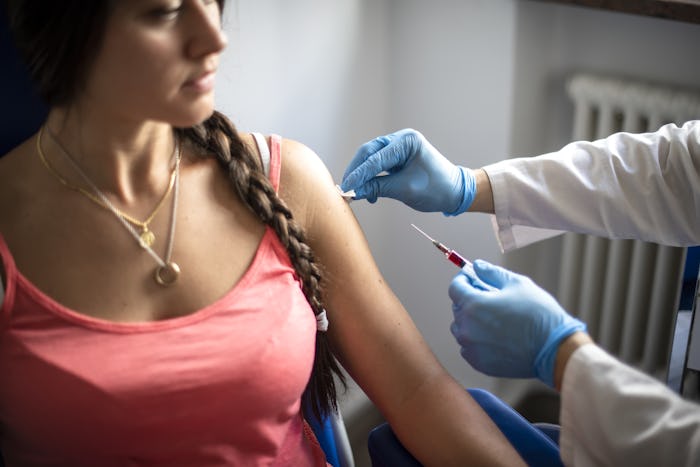News
Adults Up To 45 Can Now Get The HPV Vaccine, According To The FDA
For years, the HPV vaccines has been recommended for kids and those into their early 20s. But thanks to new advancements, it's now available for a wider age range. Last week, as CNN reported, the FDA has approved the HPV vaccine's use for adults and that's a pretty big deal.
The HPV vaccine is meant to protect against a very common sexually transmitted virus known as the human papillomavirus, according to WebMD. As noted by the Centers for Disease Control and Prevention, 79 million Americans, most in their late teens to early 20s, are infected with HPV. Essentially, that means about one in four people are currently infected with HPV in the United States, according to the CDC.
Although the virus often clears on its own, if it persists, HPV can lead to cervical, anal, and throat cancers, along with genital warts, according to the CDC. Currently, one HPV vaccine, Gardasil, is suggested as a routine vaccination for people aged 9 to 26 years old, according to SELF.
But if you're out of that age range, don't worry! The FDA has now approved the vaccine for those over 26.
On Oct. 5, the FDA approved the use of a HPV vaccine, Gardasil 9, for people between the ages of 27 and 45. This breakthrough is important because, as outlined by the agency's statement, it opens up the approved use of Gardasil to benefit populations briefly left out of the vaccine's benefits.
Dr. Peter Marks, director of the FDA's center for Biologics Evaluation and Research, said in the FDA's statement:
Today's approval represents an important opportunity to help prevent HPV-related diseases and cancers in a broader age range. HPV vaccination prior to becoming infected with the HPV types covered by the vaccine has the potential to prevent more than 90 percent of these cancers, or 31,200 cases every year, from ever developing.
In 2006, an older version of the HPV vaccine was first approved to prevent certain cancers and diseases caused by only four types of the virus, according to the FDA. That particular vaccine is no longer distributed in the United States.
Now, Gardasil 9, originally approved in 2014, offers increased protection. As noted by the FDA, it covers the same four HPV types as the original Gardasil, along with five additional trains of HPV. Gardasil 9 now offers protection against the nine types of HPV responsible for the majority of HPV-related diseases, as noted by CNN. This includes types: 6, 11, 16, 18, 31, 33, 45, 52, and 58.
Although the CDC noted that nine out of 10 HPV infections do go away on their own, the ones that stay can have serious consequences. Every year in the United States, the HPV causes 33,700 cases of cancer, according to the CDC.
When considering Dr. Marks' statement that HPV vaccinations can prevent 31,200 cases from ever developing, it's clear why this is so important. The expanded use of the HPV vaccine for adults is great, but it's also important to make sure children remain up to date. The CDC recommends kids between 11 and 12 get the HPV vaccine: two shots, 12 months apart. "Adolescents who receive their two shots less than five months apart will require a third dose of HPV vaccine," according to the CDC.
With the FDA's approval, experts are hopeful insurance will cover the adult vaccination. Without insurance, Gardisal 9 costs between $400 and $500, according to CNN. "In general, what we've seen is that once the FDA gives approval and says there is a good response to the vaccine, we would in short order expect approved coverage from insurers," Dr. Charles Leath, a gynecologic oncology specialist at the University of Alabama at Birmingham, told CNN.
As the new vaccination continues to roll out, its wider reach of protection could drastically change the impact of HPV.
